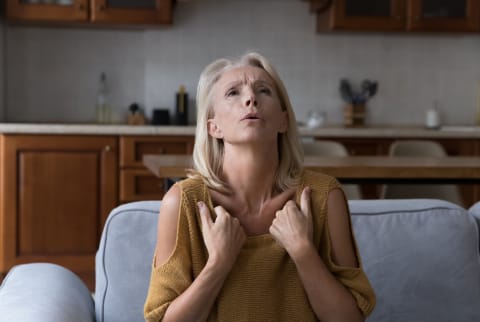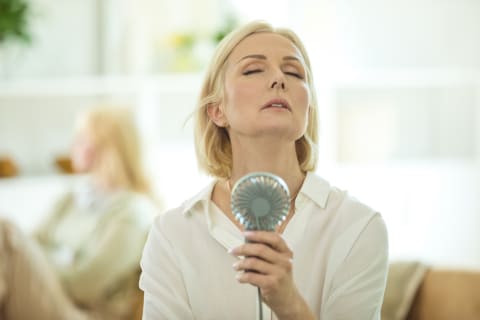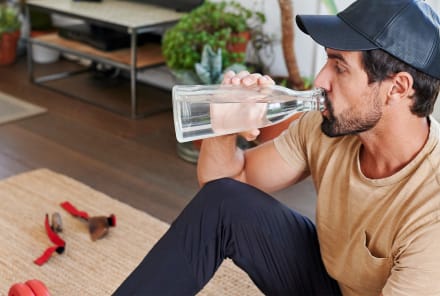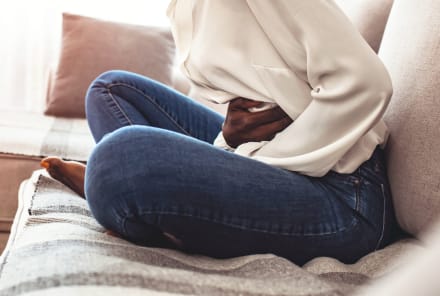Advertisement
Ever Heard of Vasomotor Symptoms Due To Menopause? Here's The Science Behind These Disruptive Symptoms

As women, most of us have heard about the infamous hot flashes and night sweats due to menopause. Even if we've yet to experience these internal bursts of heat ourselves, we've likely witnessed women in our lives experiencing this *warmer* season of life. Interestingly, though all women will experience menopause and many will experience hot flashes due to menopause —there's much about the physiology of hot flashes that we don't know. For example: hot flashes and night sweats due to menopause—where can they actually come from?
What are vasomotor symptoms (VMS) due to menopause?
Casually, we may describe hot flashes as temperature tantrums or a short vacation to the tropics. Scientifically, hot flashes and night sweats are known as vasomotor symptoms (VMS) and they can occur during menopause. They are defined by sudden and intense sensations of heat in the upper body, sometimes accompanied by sweating, reddening of the skin, chills, and a rapid heartbeat.
Nearly half of women may experience moderate to severe VMS due to menopause. Vasomotor symptoms are a legitimate medical condition that can impact many aspects of someone's life, from sleep to work to personal relationships.
These symptoms can range from mild to severe:
- Mild: sensation of heat without sweating.
- Moderate: sensation of heat with sweating, able to continue activity.
- Severe: sensation of heat with sweating, causing cessation of activity.
The science of VMS
If you've heard anything about the science behind hot flashes and night sweats due to menopause, you might think about estrogen decline. With age, the ovaries naturally produce less estrogen (and progesterone). But there's more to the story than declining estrogen.
The hypothalamus is the part of your brain that regulates temperature, acting as the body's internal thermostat. Within your hypothalamus are KNDy neurons (pronounced like candy), which play an important role in temperature control. These neurons are regulated by a balance between estrogen and a brain chemical known as neurokinin B (NKB). The body relies on this balance to keep its internal thermostat in check.
During the menopause transition, levels of estrogen and NKB become unbalanced. This causes KNDy neurons to increase signaling to the thermoregulatory center in the hypothalamus, telling your body you're hot when you're really not. To cool down, your hypothalamus triggers hot flashes and night sweats.

How long can VMS last?
While nearly half of women may experience moderate to severe VMS due to menopause, there's no guaranteed time frame for how long these symptoms will last. One study shows that Black women experience VMS for a median of 10.1 years, Hispanic women experience VMS for a median of 8.9 years, white women experience VMS for a median of 6.5 years, and Japanese and Chinese women experience VMS for a median of 4.8 and 5.4 years, respectively.
How to treat VMS
Many women are reticent to seek help for their menopausal symptoms, but it doesn't have to be like that. Hot flashes and night sweats are the most commonly reported symptoms during the menopause transition—and there are a number of ways that women may be able to reduce the severity and frequency of VMS due to menopause. Talk with your doctor to learn more.
VEOZAH® (fezolinetant) is a hormone-free treatment option for moderate to severe vasomotor symptoms—AKA hot flashes and night sweats—due to menopause. It works in your hypothalamus—the area of your brain that controls body temperature.
Remember NKB? It's a chemical that binds to a receptor in your brain, and during menopause it triggers hot flashes and night sweats. VEOZAH is the first and only treatment designed to specifically block NKB binding.
VEOZAH is proven to reduce the number and severity of hot flashes day and night based on clinical studies measuring efficacy at 4 and 12 weeks. And, for some women, it can start working in as early as one week; individual results may vary, and patients should speak with their health care provider about what this may mean for them. VEOZAH is one oral tablet a day, as prescribed by your doctor. Do not use VEOZAH if you have cirrhosis, severe kidney problems or kidney failure, or if you are taking certain medicines called CYP1A2 inhibitors. Please see additional important safety information below.
Thinking about it? Start by scheduling an appointment with a medical professional and head to VEOZAH.com for more information.
The takeaway
Whether you've heard about hot flashes and night sweats for years, or you've been on the sidelines fanning the menopausal women in your life— it's challenging to prepare yourself for what's to come; particularly, if you're the one experiencing the heat waves sweeping over you mid-conversation or the drenched pajamas interrupting your sweet dreams.
Menopause can be a topic people avoid talking about. But the more we understand the science behind our symptoms (and talk about it!), the better equipped we are to have meaningful conversations with our doctors. The menopause transition shouldn't be something we want to fast-forward through. Like the rest of womanhood, it's meant to be embraced.
What is VEOZAH® (fezolinetant)?
VEOZAH is a prescription medicine used to reduce moderate to severe vasomotor symptoms due to menopause. VEOZAH is not a hormone. Vasomotor symptoms are the feelings of warmth in the face, neck, and chest, or sudden intense feelings of heat and sweating ("hot flashes" or "hot flushes").
IMPORTANT SAFETY INFORMATION
Do not use VEOZAH if you:
- have cirrhosis.
- have severe kidney problems or kidney failure.
- are taking certain medicines called CYP1A2 inhibitors. Ask your health care provider if you are not sure.
Before you use VEOZAH, tell your health care provider about all of your medical conditions, including if you:
- have liver disease or problems.
- have kidney problems.
- have any medical conditions that may become worse while you are using VEOZAH.
Tell your health care provider about all the medicines you take, including prescription and over-the-counter medicines, vitamins, and herbal supplements. VEOZAH may affect the way other medicines work, and other medicines may affect how VEOZAH works.
What are the possible side effects of VEOZAH?
VEOZAH can cause serious side effects, including:
- increased liver blood test values. Your health care provider will do a blood test to check your liver before you start taking VEOZAH. Your health care provider will also do this blood test at month three, month six, and month nine after you start taking VEOZAH.
Call your health care provider right away if you have the following signs and symptoms of liver problems:
- nausea
- vomiting
- yellowing of the eyes or skin (jaundice)
- pain in the right upper stomach (abdomen)
The most common side effects of VEOZAH include:
- stomach (abdominal) pain
- diarrhea
- difficulty sleeping (insomnia)
- back pain
- hot flashes or hot flushes
These are not all the possible side effects of VEOZAH. Tell your health care provider if you have any side effect that bothers you or does not go away.
Call your health care provider for medical advice about side effects. You are encouraged to report negative side effects of prescription drugs to the FDA. Visit fda.gov/medwatch1 or call 1-800-FDA-1088.
For more information, talk to your health care provider and see Patient Product Information for VEOZAH (fezolinetant).
The foregoing is advertiser paid content. mindbodygreen does not endorse, make any representations or warranties with respect to or verify the information contained in advertiser paid content.
1 Source

Yes, There's A Longevity Vitamin (& People Over 40 Need To Prioritize It)
Molly Knudsen, M.S., RDN

Study Investigates How Fasting Impacts Sleep, Hormone Health & More
Gretchen Lidicker, M.S.

Yes, There's A Longevity Vitamin (& People Over 40 Need To Prioritize It)
Molly Knudsen, M.S., RDN

Study Investigates How Fasting Impacts Sleep, Hormone Health & More
Gretchen Lidicker, M.S.

Yes, There's A Longevity Vitamin (& People Over 40 Need To Prioritize It)
Molly Knudsen, M.S., RDN

Study Investigates How Fasting Impacts Sleep, Hormone Health & More
Gretchen Lidicker, M.S.

Yes, There's A Longevity Vitamin (& People Over 40 Need To Prioritize It)
Molly Knudsen, M.S., RDN

Study Investigates How Fasting Impacts Sleep, Hormone Health & More
Gretchen Lidicker, M.S.















